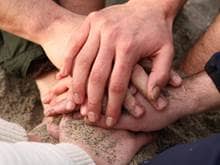
Kindness, as well as being a quality of the heart, is a skill. It deepens as we learn to pay attention to ourselves and one another with awareness. When we step out of our comfort zones and experiment with speaking to one another, listening to one another, and caring for one another in a different way, kindness grows. The fruits of greater kindness are revealed in our minds, in our lives, and in our communities. Here are 10 ways to increase your kindness quotient.
Kindness Is a Strength
 It is all too easy to consider kindness a secondary virtue, the one we reach for only as a last resort. But if we look at the strength of kindness--the way it reminds us of a sense of inner abundance, the way it helps us feel connected to others instead of isolated and apart--we can appreciate kindness as the force it is. Kindness isn’t an ally of foolishness or gullibility, but rather an ally of wisdom and courage.
It is all too easy to consider kindness a secondary virtue, the one we reach for only as a last resort. But if we look at the strength of kindness--the way it reminds us of a sense of inner abundance, the way it helps us feel connected to others instead of isolated and apart--we can appreciate kindness as the force it is. Kindness isn’t an ally of foolishness or gullibility, but rather an ally of wisdom and courage.Look for the Good in Yourself
 All too often we tend to focus on, or even fixate on, the mistakes we’ve made, the times we didn’t speak out because we were too timid, the times we spoke out brusquely or clumsily, and all of our regrets. Looking for the good within isn’t a way to deny our difficulties or problems. Instead, it's a way to broaden our outlook to make it more truthful and rid it of self-criticism. This is a foundation for kindness to ourselves.
All too often we tend to focus on, or even fixate on, the mistakes we’ve made, the times we didn’t speak out because we were too timid, the times we spoke out brusquely or clumsily, and all of our regrets. Looking for the good within isn’t a way to deny our difficulties or problems. Instead, it's a way to broaden our outlook to make it more truthful and rid it of self-criticism. This is a foundation for kindness to ourselves.Remember What We Share
 If we look deeply into any kind of behavior, we will see an urge to feel a part of something greater than our own limited sense of self, a desire to feel at home in this body and mind. This urge toward happiness is often made twisted and distorted by ignorance, not knowing where happiness is actually to be found, and so we do damaging things. But we all share the desire to be happy, a vulnerability to change, to loss, and to fragility. Remembering what we share inspires us toward kindness.
If we look deeply into any kind of behavior, we will see an urge to feel a part of something greater than our own limited sense of self, a desire to feel at home in this body and mind. This urge toward happiness is often made twisted and distorted by ignorance, not knowing where happiness is actually to be found, and so we do damaging things. But we all share the desire to be happy, a vulnerability to change, to loss, and to fragility. Remembering what we share inspires us toward kindness.Cultivate Gratitude
 Rather than taking inspiring voices for granted, or overlooking the helping hands that might have picked us up when we have fallen, we can make an effort to hold them in our hearts. Sometimes even a small act of kindness on someone’s part makes an essential difference for us. Cultivating gratitude is a way of honoring these people, and also a way of lifting our spirits and reminding us of the power of good-heartedness.
Rather than taking inspiring voices for granted, or overlooking the helping hands that might have picked us up when we have fallen, we can make an effort to hold them in our hearts. Sometimes even a small act of kindness on someone’s part makes an essential difference for us. Cultivating gratitude is a way of honoring these people, and also a way of lifting our spirits and reminding us of the power of good-heartedness.Practice Generosity
 The Buddha said, “If you knew as I did, the power of giving, you would not let a single day pass without sharing.” We all have something to give: it may be material, large or small, it may be a smile, or an attentive conversation in the elevator. Perhaps you let a stranger get ahead of you on line, or give a co-worker a small gift, or write a late-night note of appreciation. Any act of generosity--material or of the spirit, small or large--is a meaningful expression of kindness.
The Buddha said, “If you knew as I did, the power of giving, you would not let a single day pass without sharing.” We all have something to give: it may be material, large or small, it may be a smile, or an attentive conversation in the elevator. Perhaps you let a stranger get ahead of you on line, or give a co-worker a small gift, or write a late-night note of appreciation. Any act of generosity--material or of the spirit, small or large--is a meaningful expression of kindness.Meditate on Kindness
 Each day we can take the time to quietly hold others in our hearts and wish them well. Any particular day it might include someone who has been helpful or inspiring to us, someone we know who is feeling alone or afraid, someone who is experiencing triumph and joy, or someone we are about to meet with some trepidation. We might, depending on the circumstances of our lives, particularly include children or animals along with adult people. Taking just 10 minutes a day to reflect in this way is a powerful path to transformation.
Each day we can take the time to quietly hold others in our hearts and wish them well. Any particular day it might include someone who has been helpful or inspiring to us, someone we know who is feeling alone or afraid, someone who is experiencing triumph and joy, or someone we are about to meet with some trepidation. We might, depending on the circumstances of our lives, particularly include children or animals along with adult people. Taking just 10 minutes a day to reflect in this way is a powerful path to transformation.Listen to Others Carefully
 Often we have conversations where we are only partially paying attention, while at the same time we are thinking about the next email we need to send, or what we forgot to mention to the last person we spoke to. We also commonly make many assumptions about the person we are talking to and no longer fully listen; in effect, we have taken their file, put it in a folder, and filed it away in a drawer. “Oh, they are boring. Their comments in the past were unimpressive.” It is a powerful gesture of kindness, and one that leaves us open to many surprises, to really listen.
Often we have conversations where we are only partially paying attention, while at the same time we are thinking about the next email we need to send, or what we forgot to mention to the last person we spoke to. We also commonly make many assumptions about the person we are talking to and no longer fully listen; in effect, we have taken their file, put it in a folder, and filed it away in a drawer. “Oh, they are boring. Their comments in the past were unimpressive.” It is a powerful gesture of kindness, and one that leaves us open to many surprises, to really listen.Include Those Who Seem Left Out
 In a conversation with a group of people, there may be those too shy to speak out unasked. In a room full of partygoers, there may be some who hardly know anyone there. We can probably all remember that awful feeling of wanting to feel a part of a group but instead feeling left out and unseen. At one event I arrived earlier than my friends and ended up approaching a woman standing alone and seeming ill at ease. (In fact she had been dismayed at not knowing anyone there.) We ended up having many common interests and connections--and spent a delightful time together.
In a conversation with a group of people, there may be those too shy to speak out unasked. In a room full of partygoers, there may be some who hardly know anyone there. We can probably all remember that awful feeling of wanting to feel a part of a group but instead feeling left out and unseen. At one event I arrived earlier than my friends and ended up approaching a woman standing alone and seeming ill at ease. (In fact she had been dismayed at not knowing anyone there.) We ended up having many common interests and connections--and spent a delightful time together.Refrain from Speaking Ill
 A friend told me about a time he resolved not to talk about any third person; if he had something to say about someone, he would say it to them instead. If you feel tempted to put someone down, assume knowledge of their bad motives, or generally prove their inferiority, take a breath. Even though we might feel a rush of power in saying those words, they can easily come back to haunt us. We ultimately get no benefit from dividing people and sowing seeds of dissension and dislike. There are ways to talk honestly about wrong behavior without derision or condemnation for the person acting.
A friend told me about a time he resolved not to talk about any third person; if he had something to say about someone, he would say it to them instead. If you feel tempted to put someone down, assume knowledge of their bad motives, or generally prove their inferiority, take a breath. Even though we might feel a rush of power in saying those words, they can easily come back to haunt us. We ultimately get no benefit from dividing people and sowing seeds of dissension and dislike. There are ways to talk honestly about wrong behavior without derision or condemnation for the person acting.Empathize with Others
 It is always useful to put ourselves in someone else’s place. As the old proverb suggests, “Walk a mile in another person’s shoes before you pass judgment.’” Even if we are going to take strong action to try to change someone’s behavior, a sense of empathy and understanding for them won’t weaken us. If anything, that element of kindness will broaden our avenues of response to a problem, and engender greater creativity as we seek options to ease suffering all around
It is always useful to put ourselves in someone else’s place. As the old proverb suggests, “Walk a mile in another person’s shoes before you pass judgment.’” Even if we are going to take strong action to try to change someone’s behavior, a sense of empathy and understanding for them won’t weaken us. If anything, that element of kindness will broaden our avenues of response to a problem, and engender greater creativity as we seek options to ease suffering all around


Tidak ada komentar:
Posting Komentar